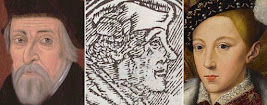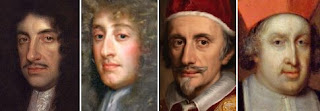Religious Freedom.
[by J. C. W. Lindemann] (cont'd from Part 6)
England can also tell of what a misfortune it is when the sovereign wants to rule over consciences as well.
There, too, Luther's teaching had won many followers; but King Henry VIII (1509-47), who believed himself offended by Luther, had resolutely opposed the introduction of the Reformation. Until the year 1527 he had been a servant completely obedient to the Pope; but when Clement VII did not want to carry out the eagerly desired divorce from his wife, he gradually became an enemy of the Pope. As early as 1531 he assumed the title of "Head and Protector of the Church and Clergy in England," and in 1534 he was recognized by Parliament as "Head of the English Church," thus breaking with the Roman Pope completely and forever. But King Henry VIII had thus himself become Pope of the "Church of England" which he had made. The Parliament now allowed him and his successors: "to investigate arising errors, heresies and abuses and to use countermeasures against them.” The new king-pope knew how to make the most unrestricted use of this power. Monasteries were forcibly abolished, relics scattered, resisters imprisoned and killed.
In 1530, Henry had the parliament declare that he absolutely demanded that all differences of religious opinion in his kingdom be abolished. He also had six articles presented to it and demanded their adoption. In these articles it is taught: "that after the blessing of the bread and wine in the Lord's Supper, the substance (the essence) of both is no longer present; — that Scripture by no means demands the Lord's Supper in both forms; — that divine law does not permit a priest to marry; — that the salutary Masses of the soul, founded in Scripture, may not be abrogated; — and that auricular confession is as useful as it is necessary.
So there was not a trace of evangelical doctrine in them; this mad fool extolled the old papal lies as divine truth. And the parliament — oh shame — not only thanked the king for these articles drafted by him, but also decreed that anyone who would deny the first of them should not only be deprived of his goods, but also suffer death by fire, — from which even abjuration should not save him; but he who would persist in preaching and disputing against the remaining articles should be sentenced to the penitentiary; the mere speaking against them should result in imprisonment and loss of property in the first case, and in death in the second. Already from this, everyone can see what similarity Henry VIII's "Reformation" (?) had with that of Luther.
Bishops Shaxton and Latimer were soon after imprisoned for repudiating those articles; five hundred other persons had the same fate. Only their large numbers made it impossible to execute them all. — In 1540, Robert Barnes was burned for speaking Luther's doctrines; still others had the same fate.
During the reign of Edward VI (l547-53) reform continued in the manner begun; but biblical orthodoxy asserted itself somewhat more than before.
(Continued in "Read more" below")
But when Mary, called the Catholic, came to the government in 1553, the whole Roman nature was immediately reintroduced. As early as 1554 all Protestant bishops were deposed; everywhere the Mass was restored. Towards the end of the year the Cardinal Polus appeared to bring the papal religion completely back into vogue and practice. He exhorted the assembled Parliament to return to the obedience of the Holy See, and assured them that he had authority from the Pope to readmit the English. The Parliament (listen to this!!) now presented the Queen (and her husband, the cruel Philip II of Spain) with a very humble petition, confessed its deep remorse for the detestable separation from the Pope, and asked her to intercede with the Legate to grant absolution and to receive the English people back into the bosom of the Church!!
Polus allowed himself to be asked. To the parliament kneeling before him (!!) he granted the requested absolution; but only under the condition that all enacted laws against the Roman church would be revoked.
Now Mary began a bloody counter-reformation. From 1555 to 1558 270 persons had to die because they did not want to become Catholic again; among them were 5 bishops, 21 priests, 8 noblemen, 84 merchants, 100 lesser citizens, 25 women and 4 children. In all, this queen, called the "pious" one by the papists, is said to have murdered about 800 persons for their faith. On May 21, 1556, Archbishop Cranmer was burned because he would not submit to the Pope. Mary was already thinking of introducing the Inquisition when she died on November 17, 1558, despised and hated by most of her subjects.
Her successor Elizabeth (1558-1603) immediately released all prisoners who had been imprisoned for religion, and — admittedly with great human caution — reintroduced the religion of her father. And so in England the "ruling religion" continued to change for many years; soon the "Church of England" was victorious, and the Catholics were the persecuted; soon the latter triumphed again, and then the "heretics" were exterminated with banishment, with fire and sword! O terrible delusion that can so beguile men!
We must remember two conspiracies here. First, the so-called Gunpowder Plot. In 1604 the papists wanted to get King James I out of the way in order to strengthen papal rule in England. They wanted to blow up the whole parliament including king and crown prince at once. For this purpose Catesby and Thomas Percy, both zealous Catholics, brought 36 tons of gunpowder into the cellars of the parliament building. But before the knavery was executed, one of the conspirators was struck with conscience; he gave warning by letter, and thus untold mischief was averted. [Pg 22]
In 1677, King Charles II was to be assassinated so that his Catholic brother James [Jacob] would come to the throne and Protestantism would be completely eradicated. In this conspiracy, even Pope Innocent XI, Cardinal Howard and some Jesuits in Rome and Spain were involved. [Wikipedia articles on the "Popish Plot" blatantly label it "radical","supposed", "fictious", "hysteria."; another writer labels it only "somewhat mysterious."]
And now let no one forget that behind all these atrocities, in so far as they proceeded from Catholics, stood the Pope as the actual human author of them. It was he, after all, who claimed to be lord of all the kingdoms of the world, and who continually commanded and encouraged the Catholic princes to exterminate all "heretics”. The popes not only rejoiced when dissenters were beheaded, drowned, burned, etc.; nay, they often instigated these persecutions by their bulls, legates, and monks (especially by the Jesuits), praised them as "holy crusades," and promised great eternal reward to those who would kill a great many heretics. Freedom of religion and conscience has never had worse enemies, as long as the world stands, than the Roman popes!







No comments:
Post a Comment
Comments only accepted when directly related to the post.